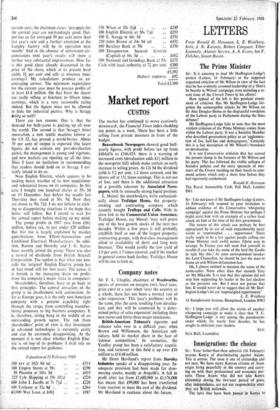Market report
CUSTOS
The market has continued to move cautiously downwards, the Financial Times index shedding ten points in a week. There has been a little selling from private investors in front of the budget.
Beaverbrook Newspapers showed good half- yearly figures, with profit before tax up from £404,676 to £546,925: there is a warning of increased costs (devaluation adds £1+ million to the newsprint bill) which make certain an early increase in selling prices. At 12s 9d the dividend yield is 5.2 per cent, 1.2 times covered, and the shares sell at 15+ times earnings. This is not out of line, and there is the additional attraction of a possible takeover by Associated News- papers, with its unusually strong liquid position.
L. Messel, the stockbrokers, write enthusiasti- cally about Trafalgar House, the property- owning and contracting company which recently bought Trollope and Coils. With its close link to the Commercial Union Assurance, Trafalgar House, say Messel, 'may well prove one of the best growth stocks of the next two decades. Within a few years it will probably establish itself as one of the largest property/ contracting groups, with first-class management allied to availability of- short and long term finanace.' This would justify the low yield of 1.9 per cent, 1.7 times covered; and if the market in general comes back further, Trafalgar House will be one to look at.
Company notes
Mr F. L. Chaplin, chairman of Woolworths, speaks of pressure on margins (SET, local rates, price cuts) in a year when 'over the country as a whole, there has not been 'a normal rate of sales expansion.' This year's problems will be' the same, plus the costs resulting from devalua- tion, and they will be countered by `a deter- mined policy of sales expansion' including three new stores and thirty-three major extensions.
British-American Tobacco's cigarette and tobacco sales rose in a difficult year, when Brown and Williamson, the American sub- sidiary, held its market share in the face of `intense competition.' In cosmetics, the Yardley group has been a satisfactory acquisi- tion, and turnover in this field is up over £10 million to £14.48 million.
Mr Denis Haviland's report from Staveley Industries speaks of a disappointing year. In- adequate provision had been made for slow- moving stocks, mainly at Asquith's. A fall in ' profit after tax from £1,688,000 to £1,176,000 has meant that £99,000 has been transferred from reserves to meet the cost of the dividend. Mr Haviland is cautious about the future. '


































 Previous page
Previous page